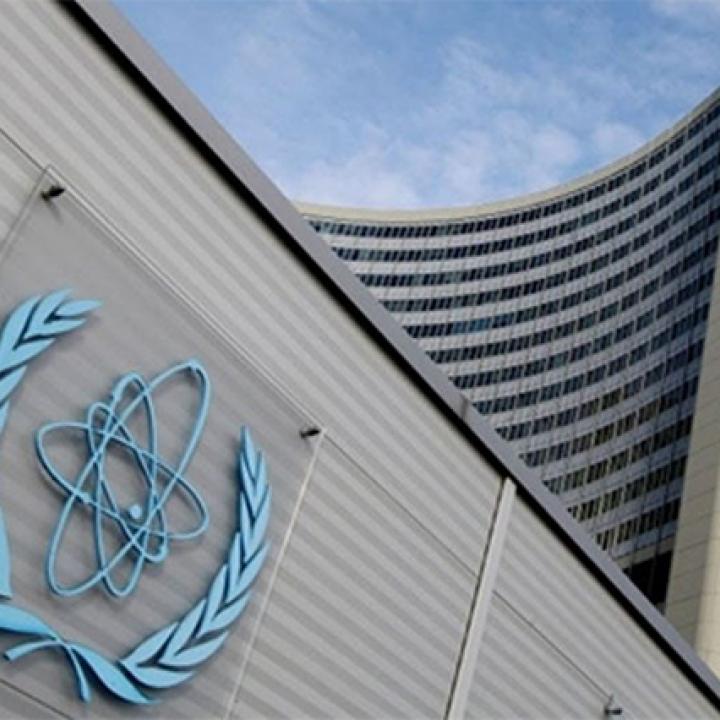
- Policy Analysis
- Policy Alert
Saudi Arabia Increases Its Cooperation with World’s Nuclear Watchdog

The small but significant step could facilitate U.S. technology transfers to the kingdom, said to be a key element in any potential Israeli-Saudi normalization deal—but proliferation concerns persist.
A two-sentence tweet this week by Rafael Grossi, director-general of the Vienna-based International Atomic Energy Agency, marks a notable advance in Saudi Arabia’s willingness to accept oversight of its budding nuclear program. The August 7 post on Twitter/X delivered the following announcement: “As nuclear activities are poised to grow in Saudi Arabia, facilitating the work of IAEA staff as they carry out duties is key. Today, [Saudi Arabia] deposited Instrument of Acceptance for the Agreement on the Privileges and Immunities of the [IAEA], providing protection to our staff.”
Riyadh has long desired a significant civilian nuclear power sector and access to uranium enrichment and reprocessing technology. Its facilities are only inspected according to a Small Quantities Protocol (SQP) agreement with the IAEA, leaving the international community with little oversight of its nuclear activities. Grossi has previously described SQPs as a weakness in the global nonproliferation regime, which the IAEA supervises in its dual role of preventing the spread of nuclear weapons and encouraging the peaceful use of nuclear technology. Now that a small research reactor in Riyadh is near to coming online, more formal safeguards are in order.
The next step will be implementation of the kingdom's Comprehensive Safeguards Agreement (CSA), which requires Riyadh to accept inspections of its facilities. At the annual IAEA General Conference in September 2023, Saudi energy minister Prince Abdulaziz bin Salman stated that the government would move toward a CSA but did not mention if it would agree to the Additional Protocol, which allows for more intrusive inspections without advance warning.
A looming challenge is how to square these statements and moves with past comments made by the kingdom’s de facto leader (and the energy minister’s half-brother), Crown Prince Muhammad bin Salman, who has repeatedly warned that Saudi Arabia will develop nuclear weapons if its Persian Gulf rival Iran does so. This stance explains his desire for a security pact with the United States; it also erects a major stumbling block for Senate approval of any such arrangement. Yet the potential diplomatic prize at stake for Washington—Saudi normalization with Israel—means that hopes for a U.S.-Saudi pact remain alive even in the remaining months of the Biden administration.
The IAEA is particularly concerned about two facets of Saudi Arabia’s nuclear activities: its exploitation (with Chinese help) of uranium deposits judged to be commercially nonviable (raising questions about why they are being exploited at all), and the existence of two buildings near Riyadh that were described as potential undeclared nuclear facilities back in 2020. Additionally, the kingdom had close relations with the late Pakistani nuclear scientist A. Q. Khan, who sold stolen European enrichment technology and, in certain cases, weapon designs to China, Iran, Libya, and North Korea, greatly facilitating each regime’s nuclear weapons program. In 1999, then-Saudi defense minister Prince Sultan bin Abdulaziz visited Pakistan’s main enrichment plant outside Islamabad—part of a long history of bilateral nuclear links that stretch from the 1970s (when the kingdom reportedly helped finance Islamabad’s nuclear weapons development) to earlier this year, when Defense Minister Khalid bin Salman was the guest of honor at a Pakistani military parade that included nuclear-capable missiles.
This week’s demonstration of Saudi willingness to accept inspections is a small diplomatic step and an indication of progress being made. How it ties in with Washington’s willingness to transfer civilian nuclear technology to the kingdom in order to seal an Israeli normalization deal is unclear. Congressional opposition is likely if said deal entails diluting the requirements of Section 123 of the Atomic Energy Act on enrichment and reprocessing technology. But the global nonproliferation regime has conceded exceptions in the past. The more immediate proliferation challenge is arguably Iran, which no longer observes the IAEA’s Additional Protocol, has actively harassed inspectors, is reportedly close to having enough high-enriched uranium for a nuclear device, and has worked on weapon designs. Shifting the Middle East in the direction of peaceful nuclear aspirations seems almost delusional against this backdrop, but efforts continue to be made.
Simon Henderson is the Baker Senior Fellow and director of the Bernstein Program on Gulf and Energy Policy at The Washington Institute.



